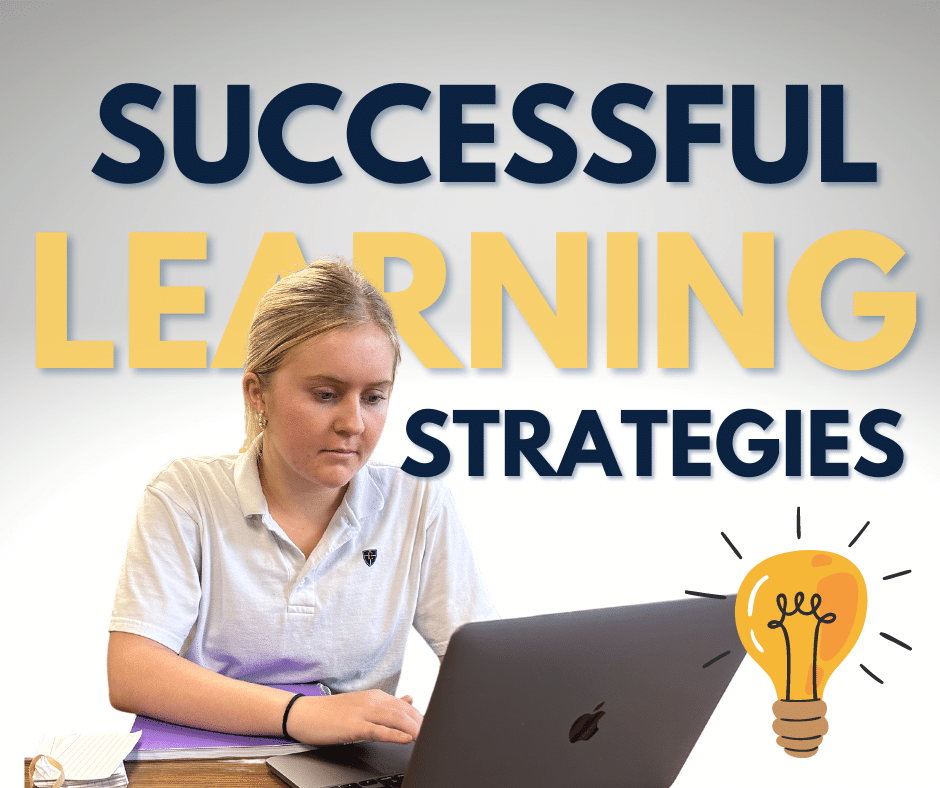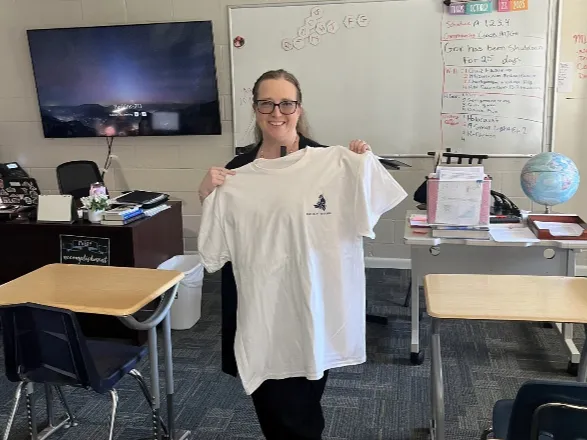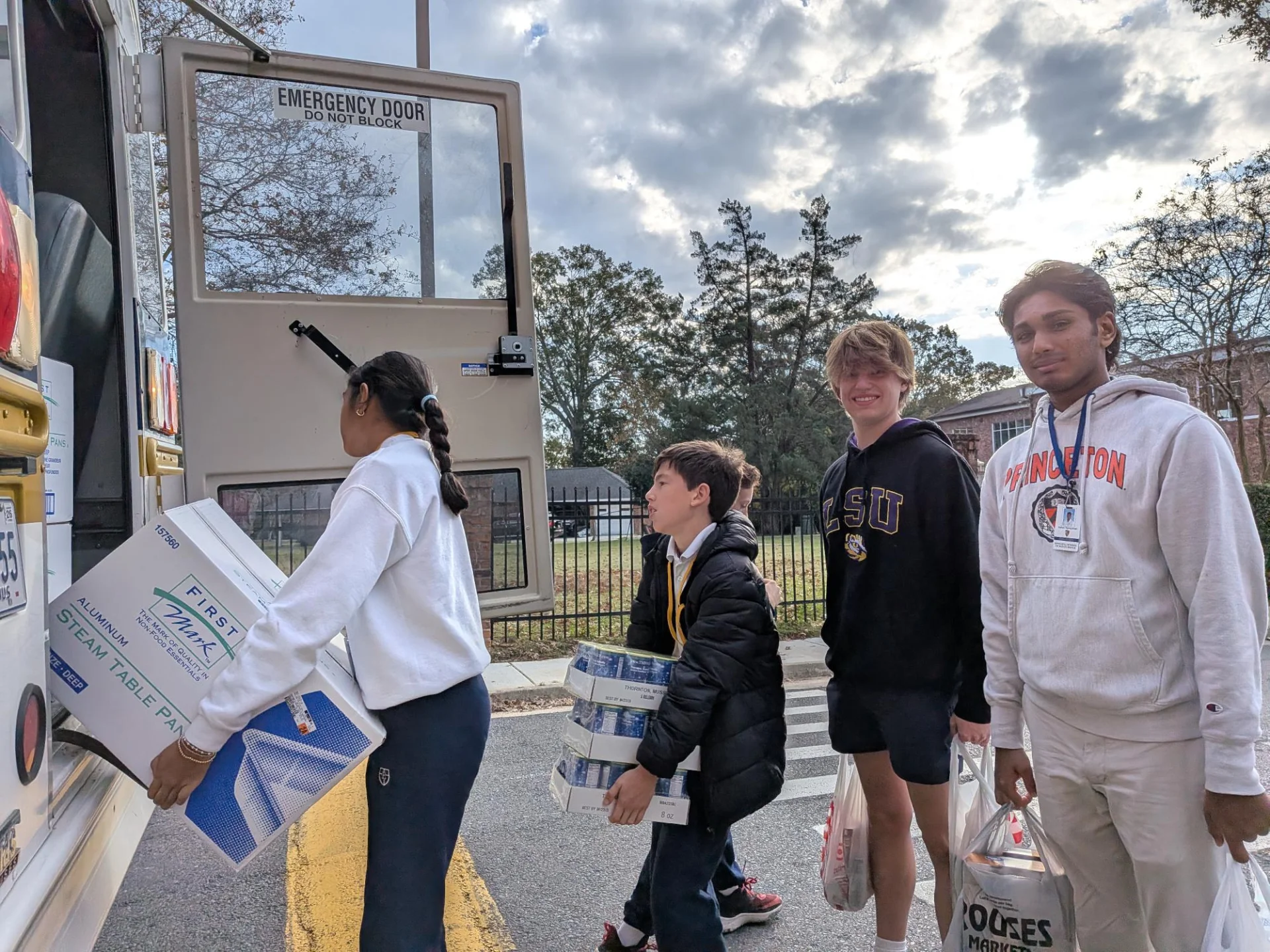- Admission
- Discover Episcopal
- Our Program
- Athletics
- Arts
- Spirituality
- Student Life
- Support Episcopal
- Alumni
- Parent Support
- Knightly News
- Contact Us
- Calendar
- School Store
- Lunch Menu
« Back
Learning Strategies Series Benefits Upper School Students
October 12th, 2022

How did you study for tests when you were in school? Likely, you read over notes or your textbook the day before the test. Passively reading notes is how most adults remember studying, and this form of studying feels effective. That’s because when you’ve just read something, the information is stored in your short-term memory and is easy to recall. Reviewing notes and texts might help you answer questions at the moment or even a short time later. But when asked to recall that information days, weeks, or months later, such as for a semester exam, another class, or work, chances are you wouldn’t remember the information very well. Passively reading over notes has long been a commonly used study strategy. Unfortunately, it is also an incredibly ineffective method of learning.
But maybe you also remember using flashcards and working in study groups to quiz each other. You may not have realized it, but the quizzes and tests you were taking helped you learn the material. These tried and true strategies are effective, along with other methods you may not be as familiar with. Decades of research into memory and learning have shown us how we can remember information more accurately, for longer, and use that information in different contexts.
Most students and adults don’t know how their brains work. Upper school classes focus on academic topics, the arts, physical education, and more. Teachers incorporate study and learning strategy lessons into their content. Still, schools rarely have courses focused solely on how we learn and the critical roles of memory and recall in the process.
“...learning is an acquired skill, and the most effective strategies are often counterintuitive.”1
This quote from Make It Stick: The Science of Successful Learning by Peter Brown et al. is at the heart of a new series of mini-lessons designed to help our 9th and 10th-grade students learn how to learn effectively. These lessons are delivered in study halls by Fellows from the Academic Resource Center (formerly the Writing Center), students who specialize in helping their peers develop skills in many academic areas including writing, math, and science. Because they are students, the Fellows are able to incorporate their experiences into the lessons, giving the younger students real-world examples.
Each lesson builds upon the previous ones, starting with an overview of how the brain works and what it means to learn. From there, students come to understand the importance of spaced practice. Spaced practice simply means taking breaks between reading or hearing something and trying to remember or use it. Rest provides the time needed for information to get stored in long-term memory. Practice helps the brain strengthen memory and make connections. Students learn how vital self-testing is for retaining information and avoiding the trap of familiarity, the feeling that you know something because it makes sense when you read it or hear it but can’t recall it later on a test. Students learn about effective note-taking strategies, including the importance of putting information in your own words. They consider how to incorporate interleaving into their study strategies, mixing up topics or forms of practice to improve their ability to access and use the information on a test or real life. They learn about memory cues and dual coding, using pictures and real-world examples to help them remember and understand. And then, they discuss ways to organize their time so they can use these strategies throughout a course.
Episcopal’s teachers already incorporate many of these learning strategies into lessons during class and homework. They suggest these methods when working with students individually. Unfortunately, many of these strategies feel difficult. When used, students will feel like they are learning slowly and want to revert to less effective methods that feel easier. This discomfort is why it’s so important to teach students about how these strategies work and the evidence to support their use. Understanding the why can help students stick with these effective strategies even when it may feel hard. Because in these lessons, we’re not just teaching students how to study; we’re teaching them to persevere.
1Brown, Peter C., et al. Make It Stick: The Science of Successful Learning.
Cambridge, Belknap press of Harvard UP, 2014.

Sara Fenske
Dr. Sara Fenske pursued a career in education because of her love of science and desire to share that passion with others. Knowing the impact a great education can have, Sara chose to focus on teaching and curriculum design, with a focus on continuous improvement. Dr. Fenske joined Episcopal as a member of the science faculty. In 2018 she transitioned into the role of Dean of Academics and is now the Assistant Head of School for Academic Affairs. In this position, Dr. Fenske works collaboratively with the Head of School, division heads, department chairs, and faculty members to ensure Episcopal’s continued strong and relevant academic performance. Before joining Episcopal, she was the Science Department Chair and taught at Linden Hall in Pennsylvania. She has a Bachelor of Science in cell and molecular biology from the University of Michigan, Ann Arbor, and a Ph.D. in biology from the Massachusetts Institute of Technology in Cambridge, Massachusetts.
The Episcopal School of Baton Rouge 2025-2026 application is now available! For more information on the application process, to schedule a tour, or learn more about the private school, contact us at [email protected] or 225-755-2685.
Posted in the categories All, Upper School.
Other articles to consider
 Dec17A Christmas Message from Father Patrick
Dec17A Christmas Message from Father PatrickFather Patrick shares a special message for the season.
See Details Dec12From Service to Song: Lower School Students Celebrate Christmas in Two Languages
Dec12From Service to Song: Lower School Students Celebrate Christmas in Two LanguagesEpiscopal third graders celebrated the season and French heritage with a special holiday program in the Lewis Family Memorial Chapel of the Good Shepherd.
See Details Dec11Upper School Recognizes Excellent Educators
Dec11Upper School Recognizes Excellent EducatorsThis semester, Upper School students recognized teachers who inspire, support and challenge them every day. Congratulations to our Excellent Educator honorees.
See Details Dec11Smashing Goals, Building Community: Episcopal’s Shepherd’s Market Food Drive Success
Dec11Smashing Goals, Building Community: Episcopal’s Shepherd’s Market Food Drive SuccessThe Episcopal Shepherd’s Market Food Pantry “Great Turkey Giveaway” food drive broke records. We’re proud of our students and families for building community through service.
See Details
Categories
- All
- Admission
- Athletics
- College Bound 2019
- College Bound 2020
- College Bound 2021
- College Bound 2022
- College Bound 2023
- College Bound 2024
- College Bound 2025
- Counselors Corner
- Episcopal Alumni
- Giving
- Head Of School
- Lower School
- Middle School
- Spirituality And Service
- Student Work
- The Teachers' Lounge
- Upper School
- Visual And Performing Arts










